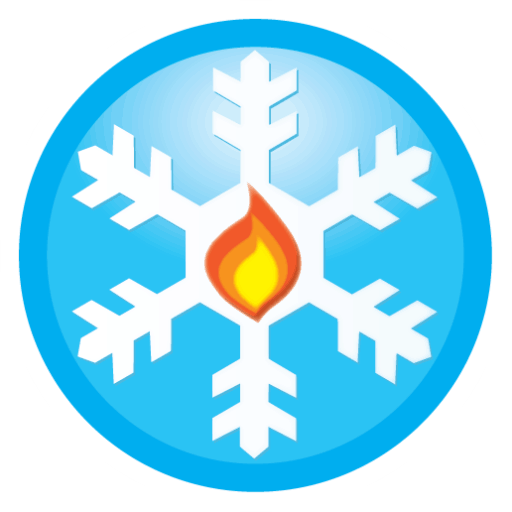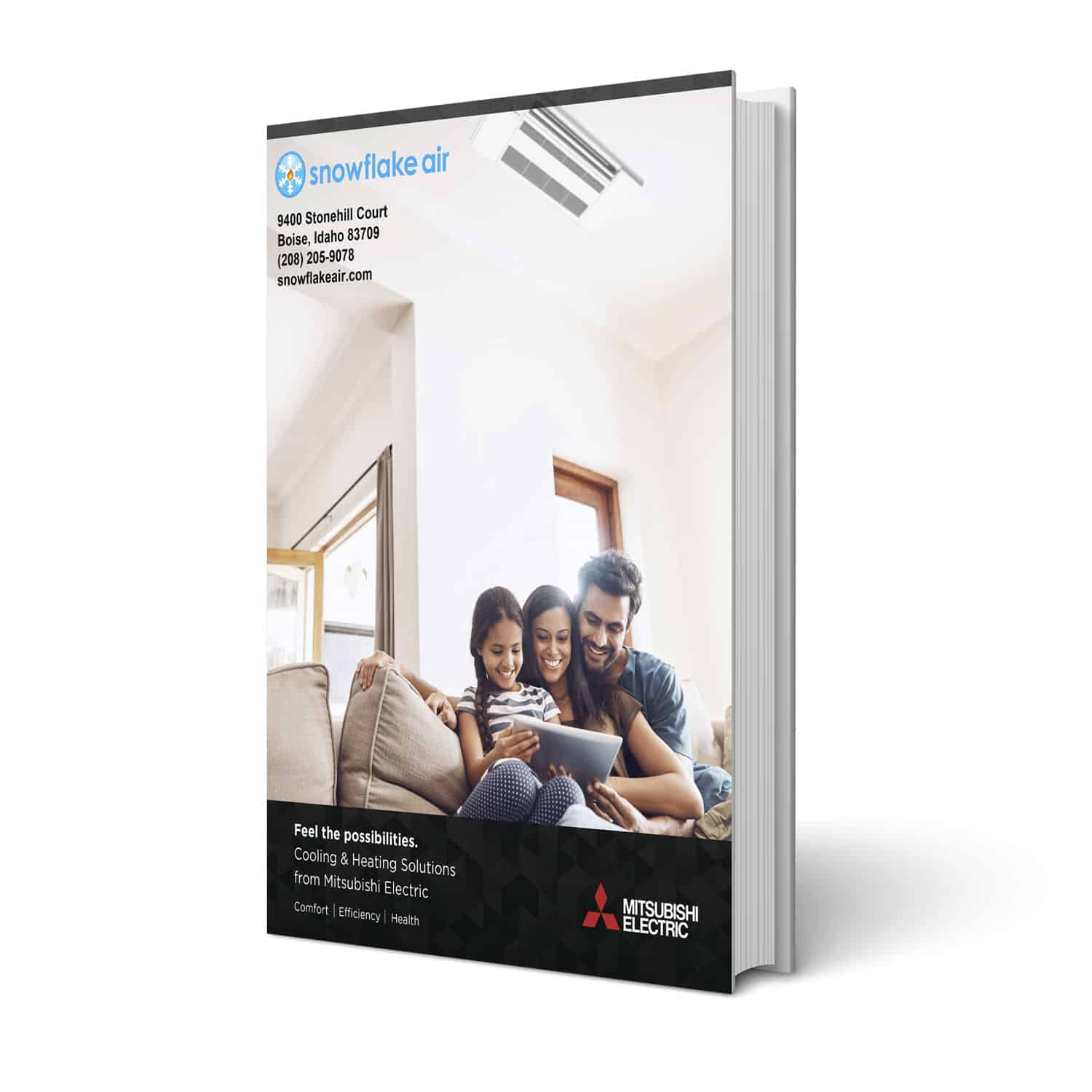Troubleshoot: Why Is My AC Running But Not Cooling My Home?
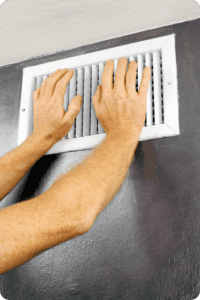 Once summer rolls around, the last thing you want to deal with is a hot, muggy house. But, sometimes that happens even when your air conditioner is on and appears to be running.
Once summer rolls around, the last thing you want to deal with is a hot, muggy house. But, sometimes that happens even when your air conditioner is on and appears to be running.
It’s especially frustrating because the problem can sneak up on you. Maybe you hear the system running and assume you’ll get more comfortable in a few minutes. Or, you finally realize that you’ve been hot and miserable for a few days or longer.
And, of course, the last thing you want to do is spend money on AC repair.
Well, the good news is that you may be able to solve the problem yourself!
In this article, we’ll review the four most common reasons that ACs in Boise, ID homes won’t cool your house even when they’re running.
You can fix the first two on your own. The next two require a professional, but you may save yourself some time and money by getting ahead of the problem.
Meanwhile, if you notice any heating or cooling issues in your Treasure Valley home, call Snowflake Air right away at (208) 779-5596. You always want to nip a small problem in the bud. Otherwise, it could get worse and more expensive to repair.
Four Reasons Your AC Runs Without Cooling (And What To Do About Them)
Here are four places to check when your AC is running but not cooling your home:
- Thermostat Is Set Incorrectly
- Dirty Filter
- Refrigerant Leak
- Blocked Or Clogged Condenser Coil
These are all common signs your AC is broken. Or, at least, something’s off. Let’s explore each one.
Thermostat Is Set Incorrectly
If your thermostat is set to heat, your system won’t come on in the summer. It’s waiting for the temperature to drop below the setting and then provide heat. So if your home is already cooler than that setting, you’ll get warm air from your air conditioner instead of cool air.
Another typical setting is “Fan Only.” This circulates the air through your home without warming or cooling it. If your home is still warm, you get hot air instead of cooling through the vents.
What To Do
Set your thermostat to “Cool” or “AC” and “Auto” instead of “On” or “Fan Only.” Also, change the batteries. Low power can cause a thermostat to malfunction.
Dirty Filter
A clogged air filter affects air circulation. If that screen is blocked with dust and debris, the air coming in from your home won’t enter the system.
If the problem’s really bad, your AC won’t turn on at all. Internal failsafes recognize there’s no air coming in and won’t start the cooling process. Other times, however, you end up with low airflow or air that’s still warm.
What To Do
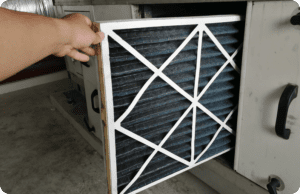 Remove the filter and look at the cloth screen. Is it gray or almost black? If so, you’ve had it for way too long. It should still be white, and that discoloration is from all the dust on it.
Remove the filter and look at the cloth screen. Is it gray or almost black? If so, you’ve had it for way too long. It should still be white, and that discoloration is from all the dust on it.
Replace it with a new one right away. After that, we recommend changing it once a month when your heat or AC is running. And every three months otherwise.
Refrigerant Leak
Refrigerant or coolant runs through your HVAC system in a closed-loop. In other words, it doesn’t get used up like gas or oil for heat. So, you should never have to replace it unless something’s wrong.
However, there’s not enough of that cooling agent in your system when there’s a leak. Warm air passes over the coil and goes back out through the house just as warm. You’re not getting cold air through the vents.
What To Do
You can’t fix a refrigerant leak yourself. But, you can find the problem and hopefully save money by calling for repairs before the problem gets worse.
If you’ve checked your thermostat and air filter, head outside to the condenser. You won’t see any refrigerant leaking, but you can use your other senses.
Check for chemicals or rotten smells around the unit. Listen for a steady hissing sound. Both indicate a leak.
In most cases, you’ll need a full recharge for your system. We can do a partial recharge in some cases if not too much has leaked out.
But it’s essential to act fast, especially if your AC is over ten years old and still uses R22 coolant, or freon. It’s been discontinued, so prices are always going up.
Blocked Or Clogged Condenser Coil
This last problem occurs inside your furnace: a clogged or blocked condenser coil. The coil is the component that removes heat from your home. The heat gets drawn out through the coil as air passes over it.
Then, the now-cool air gets pumped back into your home. However, if the coil is blocked or clogged, the heat transfer won’t occur.
A coil that’s dirty with dust or dirt, or even mold and mildew, won’t do the job anymore.
What To Do
You can’t take apart your system, but you can check for two other common problems: ice around your condenser outside or low airflow in the house.
When the heat transfer process gets thrown off, the refrigerant creates frigid temperatures around the condenser — so cold that moisture around it freezes. That creates ice on the unit, even in the summer.
Or, if you’re noticing low airflow plus warm air in the house, and you changed the filter, a clogged coil may be to blame. Call your HVAC contractor to check it out.
How To Prevent Air Conditioner Problems This Summer
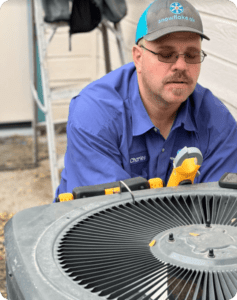 Getting an AC tune-up in the spring is an excellent way to prepare you air conditioner for the summer.
Getting an AC tune-up in the spring is an excellent way to prepare you air conditioner for the summer.
A tune-up involves a certified HVAC tech cleaning, inspecting, and optimizing the system. You’ll get rid of any debris that clogs filters or coils and blocks airflow. If anything’s broken or worn down, they’ll replace it before it causes a problem.
Finally, they’ll tighten any bolts or fasteners, lubricate moving parts, and ensure all the electrical connections are working and solid.
The result? Fewer breakdowns, better cooling, and lower electric bills all summer.
And, you’ll get more for your money over time: Your HVAC system will last longer, so you’ll get a few more years out of your system before having to pay for a new air conditioning unit.
AC Repair In Boise, ID
Snowflake Air is the trusted name for fast, expert, and reliable AC Repair In Boise, ID, Caldwell, Eagle, Kuna, and up in Valley County. We service furnaces and electric heaters and specialize in heat pumps and mini split systems. Click below to set an appointment or call (208) 779-5596.


